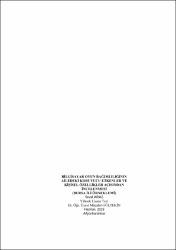Bilgisayar oyun bağımlılığının ailedeki koruyucu etkenler ve kişisel özellikler açısından incelenmesi (Bursa ili örneklemi)
Abstract
Bu araştırmanın amacı; ortaokul öğrencilerinin bilgisayar oyun bağımlılığı düzeylerini ailedeki koruyucu etkenler ve kişisel özellikler açısından incelemektir. Çalışmada betimsel araştırma modellerinden genel tarama modeli kullanılmıştır. Araştırmanın çalışma evrenini Bursa il merkezinde yer alan resmi ortaokullarda öğrenim gören öğrenciler oluşturmaktadır. Araştırmanın örneklem grubunu ise belirtilen evren içerisinden seçilen 945 öğrenci oluşturmuştur. Veri toplama araçları olarak “Çocuklar İçin Bilgisayar Oyun Bağımlılığı Ölçeği” (Horzum,2008) ve ‘‘Ailedeki Koruyucu Etkenler Ölçeği’’(Danışman ve Köksal, 2011) kullanılmıştır. Elde edilen verilerin analizinde betimsel istatistikler (frekans, yüzde, ortalama), Kruskal Wallis H- Testi, Mann Whitney U-Testi, Kolmogorov- Smirnov Testi ve Pearson korelasyon analizi kullanılmıştır. Araştırma sonucunda, öğrencilerin bilgisayar oyun bağımlılığı düzeylerinin düşük seviyede olduğu görülmüştür. Cinsiyet değişkeni açısından erkek öğrencilerin, kadın öğrencilere göre bilgisayar oyun bağımlılığı yüksek bulunmuştur. Ayrıca öğrencilerin bilgisayar oyun bağımlılığı düzeylerinde, anne-baba durumlarına (birlikte-ayrı-üvey), bilgisayar oynama sıklığı, tercih ettikleri oyun türüne göre anlamlı farklılıklar bulunmazken; sınıf düzeyi, anne-baba eğitim düzeyi, sosyoekonomik durum, günlük bilgisayar kullanım süresi, bilgisayar kullanımlarının ebeveynleri tarafından kontrol edilip edilmemesi, evlerinde internetin olup olmaması ve oyun oynama aracı değişkenlerine göre anlamlı farklılıklar tespit edilmiştir. Öğrencilerin bilgisayar oyun bağımlılığı düzeyi ile ailedeki koruyucu etkenler ölçeği toplam puanı arasında [r=-.12**] negatif yönde anlamlı ilişkiler saptanmıştır. The aim of this study is to examine the computer game addiction level of the secondary school students in terms of family protective and demographic factors. In the study, survey method, one of the qualitative methods, was used. The study population consists of the students studying at the secondary schools in the city center of Bursa. The sample of the study consisted of 945 students selected from the determined population. In the study, “The Computer Game Addiction Scale for Children” (Horzum, 2008) and, “The Family Protective Measures Scale” (Danışman and Koksal, 2011) were used as data collection tools. Kolmogorov-Smirnov test was used to determine whether the data distribution was normal. Descriptive statistics (frequency, percentage, mean), Kruskal Wallis H-Test, Mann Whitney U-Test, and Pearson correlation analysis were used to analyze the data. As a result of the study, it was seen that students' computer game addiction was at low level. In terms of gender variable, male students were found to be more addictive than female students. In addition, there were no significant differences in computer game addiction level of the students in terms of parental status (together-divorced-step), frequency of computer playing, and the type of games they preferred. On the contrary, significant differences were determined according to the educational level of parents, socioeconomic status, daily computer usage period, whether computer use is controlled by the parents, whether students have computers in their homes, and game tool. Moreover, significant negative relationships (r = -. 12 **) were found between the level of computer game addiction and the total score of the family protective factors.
Collections
- Yüksek Lisans Tezleri [2074]



















